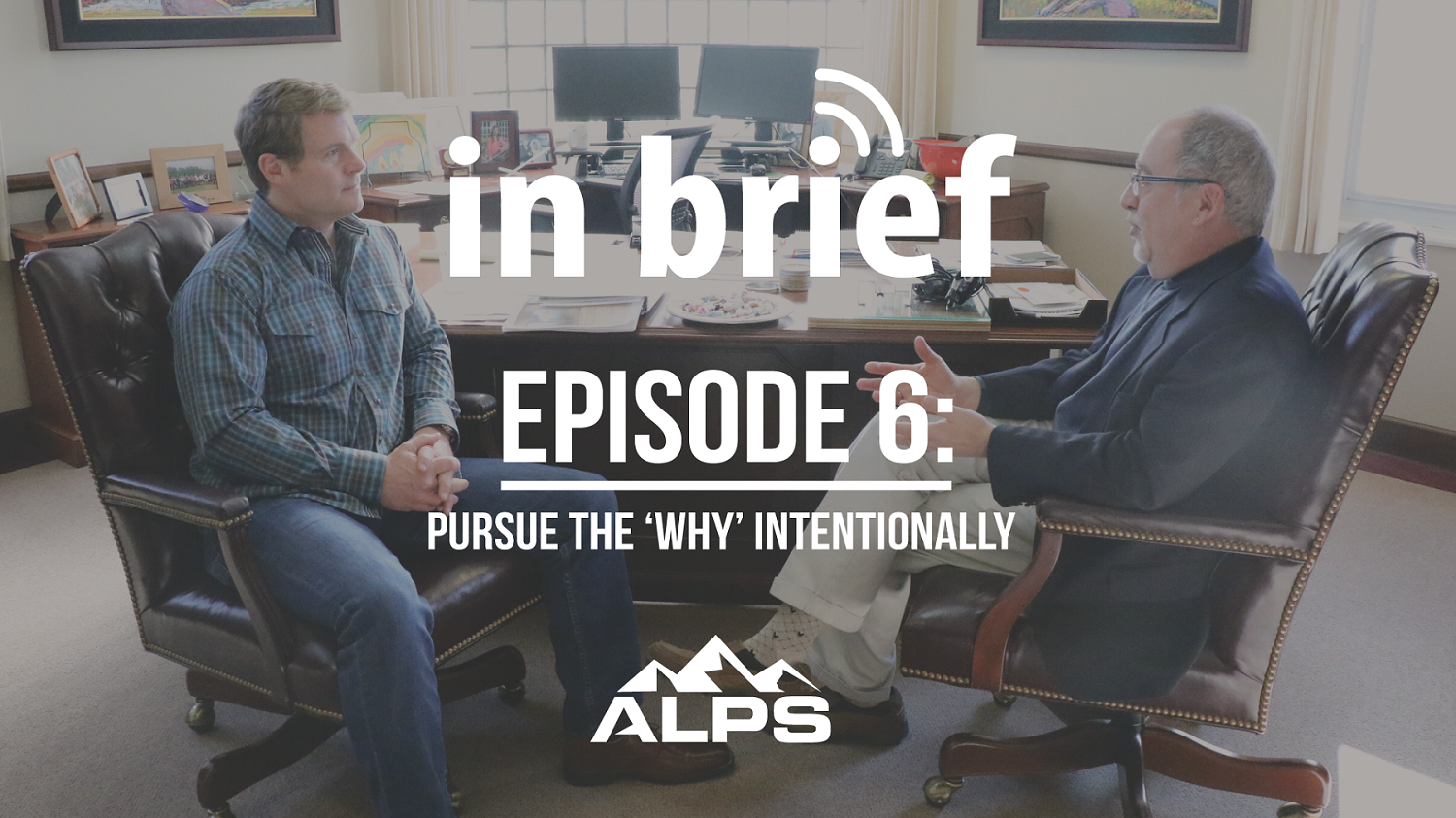19 min read
ALPS In Brief — Episode 50: Desperate Times Call For Desperate Measures
Over the 3 years following this global recession spurred by COVID-19, we’ll see a spike in bankruptcies, business dealings gone south, divorces, and...
We've crafted solutions tailored to your firm
The world of insurance for law firms can be confusing, and difficult to navigate. We've created this glossary because these common insurance terms should be easy to understand.
11 min read
 Mark Bassingthwaighte, Risk Manager
:
Updated on March 1, 2024 | Posted on October 20, 2021
Mark Bassingthwaighte, Risk Manager
:
Updated on March 1, 2024 | Posted on October 20, 2021

As we transition to more permanent work-from-home schedules, the lack of supervision and a diminished sense of community could have bigger consequences. In our latest episode, Mark explores a few risky scenarios that have played out recently while lawyers work from home. He also explores some easy-to-implement solutions to keep you and your coworkers happy and connected, even from afar.
Transcript:
Hello. I’m Mark Bassingthwaighte, the risk manager here at ALPS. Welcome to the latest episode of ALPS In Brief, the podcast that comes to you from the historic Florence Building in beautiful downtown Missoula, Montana. Today, I want to talk just a little bit about the new normal and ethics and the pandemic. Early in the pandemic, I penned an article, which is available on our blog, if you care to take a look, on the new normal and really suggesting there is no such thing as the new normal and just trying to encourage people to think about the consequences of change. The new normal is really just a period of time where change was very, very quick and widespread for so many people.
But why do I keep harping on this? Honestly, I’d say I really have some concerns about this term, “the new normal.” It seems sometimes you’ll read this in the news and people will just talk about, it seems like there’s an effort to have everyone except that all this change is permanent and we should just get used to it and life is going to be like this from here on out. Now, there’s certainly a lot of truth to that in some ways, but my concern is it feels to me at times a lot of us are just trying to get comfortable with all the change and just keep moving and not really think through, “Well, what are the ramifications of this change?” and so I want to explore that in the context of our ethical rules, because please understand, in no jurisdiction is there, if you will, the pandemic exception to any of these rules.
Just to set this up, for example, well, many of us, I should say, when we had to run home, I’ve been working remote for many, many years, but moving home very suddenly and having staff and everybody go offsite and we are trying to get the equipment home, get it set up, and stay as effective as possible, just to keep everything moving forward, now, that’s all well and good. If we had to set up a laptop and a monitor or something on a coffee table in the living room, yeah, no problem. If however, that’s still the case, now what is it, 18, 20 months, whatever we’re into this pandemic, if the laptop and the screen is still there and the kids can come home from school or working after school, if they’re homeschooling or something and gaming on the TV right next to you and a spouse is in the kitchen and can hear all that’s going on, that’s no longer acceptable. A couple of days to make a transition is one thing, but confidentiality is in play, is it not? I don’t want us to get comfortable just for the sake of finding comfort. We really need to take some time and think through the rules.
Let me share some thoughts. One of the concerns that I have, and I think we should all be thinking about, is supervision, particularly in the context of wellness. I’m going to come at this in two ways, but prior to the pandemic, everybody, the study that came out in 2016, we all learned as a profession, our profession still has some very serious problems in terms of wellness. Well, then the pandemic hits, and things just haven’t gotten any better, put it that way. It’s not unique to our profession, but mental health issues have become far more of a concern. Alcoholism has gone up, chemical dependency has gone up. These are very real concerns.
If people are working from home and not as connected as they used to be when everyone was in the office, that’s a potential problem. Are you addressing supervision issues? Is this a legitimate concern from a claim standpoint? Oh, absolutely, it is. We see claims for lack of supervision and they are not uncommon. One that immediately comes to mind is a more senior lawyer was several states away working remote, obviously, and he was just doing his thing. He had his files and everybody had their own silos and were taking care of their own matters. Well, no one was paying attention to this gentleman and he was just slipping into dementia and it was getting worse and worse, and eventually, eight critical deadlines were blown on eight different matters. Now, there are eight very viable, good claims. These aren’t minor missteps. Remember, we are our partners’ keepers, right? When it comes to malpractice, in particular, we sink or swim together as a firm.
One of the things that really made a difference to me, and I’ve talked about this before in other podcasts or articles, but ALPS deployed Teams right after we had to all go home for the pandemic, the early stages of that. I can’t tell you how significant that one product became and will remain, even now. Perhaps we’re a little bit more of a hybrid model now, which is not going to be uncommon for many, many businesses, too, but it’s a tool that we can use to replace the water cooler conversation, sitting down and having some coffee in the break room. We can just have a video call real quick. Sometimes it’s just a chat, sometimes it’s to ask a question, troubleshoot an issue, but it facilitates connectivity between all of us. It helps us maintain our culture. There are also meetings where we can get together and check up on each other: “Mark, what’s your schedule look like this week? Alison, what’s your schedule look like this week? Where are we all at? What support do you need?”
It’s just one example. There are all kinds of tools here. I’m not saying go out and use Teams. I’m trying to share that wellness and follow-through, we can even talk about competency, which I will in a little bit here in a different context, but it’s just we need to not get comfortable just with everybody being apart, we need to say, “Okay, how can we continue to maintain the culture of the firm? How can we check up on each other? How can we support each other so that we all stay on track?” Matters can go off the rails very quickly if someone is depressed or drinking more alcohol than they should and start drinking during the day, as an example. How do you think mistakes have happened? Okay, so I really do believe this is a very important issue.
Let’s also talk a little bit about confidentiality. I shared this concern with still having tech in a space that is not dedicated to a home office in any work from home remote environment. We cannot allow kids to be on the same network we’re working. You can set up your own network and then have a family network. We wall this off. We cannot be in an area where spouses, kids, friends’ kids coming over can hear calls. It’s not okay to go sit down in a crowded Starbucks, even just to get out of the house and take a lot of calls. Confidentiality is in play. There is no work-from-home exception.
At this point, I mean, I’ll just speak personally here, but if I were in practice and had any say in terms of it’s my firm, or I’m managing a firm or something along those lines, at this point, any employee, attorney, or staff that cannot have space that is truly dedicated to privacy in a work-from-home space, a separate room, doors that you can close, that kind of thing, the privilege to remain working at home isn’t going to be granted. This, I sort of look at it, it’s the work-from-home model, the hybrid model can still be in play. I think it’s a great thing. I really do. I’m a fan of it, but we need to have a professional office at home, a true office. I believe that for all kinds of reasons. Anyway, enough of that.
I will share, and some of you that read and follow me at times, my wife and I have are in the process of transitioning to Florida from Montana. We’ve been down here now about, oh, two months or so. It’s just been some supply chain delays and whatnot on the home we’re building here, but I will tell you, I absolutely would not even consider this, and I would have expected ALPS to not even say, “Hey, relocate,” if I couldn’t promise them and have to follow through on, obviously, building a dedicated home office. I really do. It’s a soundproof space. It’s high-speed internet. It is dedicated. It’s going to be my ALPSs home office. I share that to say, I guess, I’m walking the talk. I really take this very, very seriously.
Let’s talk a little bit about competency as well. Initially, we can talk about wellness. There is that piece. We need to stay competent and make sure everybody is maintaining health in exercise, eating right, doing whatever they need to do to kind of take care of themselves. Doubly important, again, in a global pandemic, but it really is something we shouldn’t minimize. But please understand competency, again, there’s no exception to rule here, right? While you or maybe several others in your firm may be very competent working from home, is everyone competent in working from home? What I mean by that is often there are different tools now in play. We may have switched to cloud computing, email, all kinds of things are changing a bit. We may be using personal equipment, whether it’s cell phones, laptops doesn’t matter. But if our processes start to change, is everybody competent? Excuse me.
Remember that, I believe it was a Texas lawyer sometime ago with, and even the meme went around for a while, “I am not a cat.” He just clearly wasn’t fully competent at the time on video conferencing. He since learned, as my understanding is, figured it out. We need to think, is everybody competent or is everybody able to competently perform their tasks, their assignments, whatever they need to do from a home-work setting, whether it’s video conferencing, e-filing, cloud computing, cloud collaboration, email, encryption, which really should be in play? Do they know how to redact documents? Can they use the case management accounting? Whatever systems we’re using, can they competently use it from the remote location? Something to think about.
But I want to take that even further, this whole notion of competency, and bring this into the cybersecurity space as well. Again, we are as lawyers to understand the benefits and risks of the relevant technology we’re using, right? Well, things change when we go home and it changes in a lot of ways. I will tell you this whole transition here in the States, I’m just going to talk about the States for a moment, has been the gift that keeps on giving to the cybercriminal space because of the work from home for all kinds of reasons.
One, just as an example, people generally tend to follow the rules and be fairly responsible when they’re using technology in the workplace. They know their rules, they know they should question email and not click on links and these kinds of things. They’re pretty good at that. Take everybody home and it changes entirely. We just let our guard down, so naturally, and it’s just, “Hey, this is my home. I don’t have to worry about strong passwords on my stuff. I don’t need to change and have different passwords for everything. Password manager? Yeah, I don’t think so. This is my home, this is my life, and this is my tech.” Now, even though they’re using it for work, doesn’t change anything. But no exceptions here, right? That’s just one example.
Home routers, I’ve had other articles and talked about this before, are a very real concern. They need to be properly set up. Again, what kinds of things am I thinking about? The rules shouldn’t change just because anybody’s working from home. Strong passwords should be in play. Two-factor authentication, password managers should be in play. VPNs need to be in use a hundred percent of the time regardless of where we are, if we are remote or even just out for the day in terms of mobile work because we’re at the courthouse or whatever it might be, we’re on a vacation, but periodically catching up with some email and some work. VPNs need to be there. Again, does everybody know how to securely teleconference? Are they keeping their systems patched? I mean, all of the things that I’ve been talking and writing about, and many others as well, in terms of cybersecurity have to be in play and implemented at home. Period. If that’s not possible, I go back to saying again, “If it were me in control, the privilege to work from home cannot be extended.”
It’s one thing that go home under these orders and make some things happen and get through the few weeks or few months, it varied for some of us, and you do the best you can. But now, this is becoming more permanent, so let’s not get comfortable with, “It’s okay.” We need, again, tech competency, professional competency. There’s no tolerance, no exception. There’s no tolerance for legal-like, no exception for competency because of a global pandemic.
Now, please understand, I am not saying that every single person, whether their lawyer or staff have to be experts in terms of tech competency, but we have to know. Our responsibility as lawyers is to assure that everybody abides by the rules, complaint of 5.1, 5.3, but we need to know there are issues out here, and then we need to go find the people that can help us. We hire the competent talent we need, whether that’s temporary in terms of a consultant to come in and set some things up, or a full-time IT staff, but we need to find the competent people that can help us to make sure we are competent from all these different settings now.
The final piece that I’d like to talk about is really thinking about policies and procedures. A concern that I have is that particularly in the solo small firm space, often we create procedures and have policies of how calendaring might be done and how conflicts need to be checked and all of that based on the work environment that we’re all in, and they can be very, very effective. Have you thought about, “Are they still as effective in a work-from-home setting, a hybrid setting?”
‘Kay, as an example, let’s say there four or five of us lawyers practicing together and we have a few staff and we designed a system of calendaring that allows for entries to be double-checked, a second set of eyes, et cetera, because we want a process that makes sure… Well, it seeks to find the occasional misstep that will happen: The date doesn’t get entered correctly, somebody didn’t glean a date off a document, that kind of thing. We want to try to create a calendar that is very, very accurate. I call this an independent yet redundant calendaring process. It worked very well in the office because we hand documents over, whatever it might be, but in the home, everybody’s separated.
Now, how do we know that people are still doing double-checking all the work? How does it get around the documents? You see where I’m going? How about mail? Is mail being distributed and we’re getting it? The systems change by their very nature that people are now spread out. I encourage you to think about, “Are our file documentation procedures still capturing everything that we need? Is everybody consistent?” A temptation might be to say, “Oh, yes.” Well, how do you know? Have you checked up? What is your quality control process to make sure? You might create the opportunity for me.
Say I’m a paralegal or something now. I can put everything digitally in files, et cetera, but are you checking to make sure I am? How do you know I’m not sitting at home having a glass of scotch with lunch and maybe two or three more in the afternoon, and I’m still working, I’m still productive, may get a little sloppy at times, but the systems and processes? Heck, I’m keeping everything on my hard drive here. Oh, by the way, I don’t have it password protected, the kids are gaming on the same network. I’m going to be low-hanging fruit for a cyber vent of some sort is what I’m trying to drive that to. Are everyone in compliance with the expectations of file documentation? Are we still creating independent yet? Redundant calendars is our conflicts check as thorough? Are we following through on all these things?
The answer to that may be yes. If so, that’s awesome. I’m just trying to underscore, please, the importance of not running with assumptions and thinking through this. It’s too easy to just get comfortable. In some ways, when staff and lawyers and even problems are out of sight, they’re out of mind, and they’re out of sight because we’re all spread out. Again, there’s so many things we could talk about here and explore. I don’t think getting into all this kind of detail is absolutely necessary and perhaps even beneficial at this point. I’m hopeful that you are able to hear me and you’ve gotten the point.
I’m going to wrap it with that and just say, hey, I want all of us to be comfortable going forward, regardless of how this pandemic ends, if it ends. Who knows? I think COVID in my mind is here to stay. We’re going to have to learn to live with it just like we did with the flu, and that’s okay, but let’s take the time to make sure and confirm everyone in our firm is responsibly comfortable so that we know we have done all we can do to assure everyone is in compliance with the ethical rules. As I see it, this is just another way to ensure success in our legal endeavors. That’s it for me, folks. I hope you found something of value in all of this and I look forward to visiting with you next time on ALPS In Brief. Have a good one. Bye-bye.
ALPS In Brief Podcast Intro/Outro Music: Walk In The Park by Audionautix is licensed under a Creative Commons Attribution 4.0 license. https://creativecommons.org/licenses/by/4.0/
Artist: http://audionautix.com/
Since 1998, Mark Bassingthwaighte, Esq. has been a Risk Manager with ALPS, an attorney’s professional liability insurance carrier. In his tenure with the company, Mr. Bassingthwaighte has conducted over 1200 law firm risk management assessment visits, presented over 600 continuing legal education seminars throughout the United States, and written extensively on risk management, ethics, and technology. Mr. Bassingthwaighte is a member of the State Bar of Montana as well as the American Bar Association where he currently sits on the ABA Center for Professional Responsibility’s Conference Planning Committee. He received his J.D. from Drake University Law School.

19 min read
Over the 3 years following this global recession spurred by COVID-19, we’ll see a spike in bankruptcies, business dealings gone south, divorces, and...

18 min read
Lawyers become lawyers to help people. To right wrongs, to champion for justice. While law school prepares you substantively for the legal issues...

8 min read
Last week the ALPS team gathered for a discussion about the company’s vision this year and beyond. Afterwards Mark sat down with ALPS CEO, David...